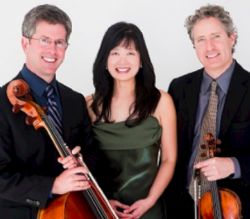|
Symphony
MYSTICAL PLANETS AND LIVELY GERSHWIN ORTIZ AT FINAL SRS CONCERT
by Peter Lert
Sunday, May 4, 2025
Symphony
VSO'S CONCERT MUSIC OF TIME, MUSIC OF PLACE
by Peter Lert
Sunday, April 27, 2025
Choral and Vocal
VOCAL ELEGANCE AND FIRE AT THE 222'S RECITAL APRIL 26
by Pamela Hicks Gailey
Saturday, April 26, 2025
CANTIAMO SONOMA SINGS AN INSPIRED GOOD FRIDAY MOZART REQUIEM CONCERT
by Pamela Hicks Gailey
Friday, April 18, 2025
DRAMATIC SHOSTAKOVICH SYMPHONY CLOSES PHILHARMONIC'S 25TH SEASON
by Terry McNeill
Sunday, April 13, 2025
LARGE COLLEGE OF MARIN AUDIENCE GREETS STOPHER ARTISTRY
by Terry McNeill
Saturday, April 5, 2025
Chamber
FRISSON DELIVERS SHIVERS OF DELIGHT
by Abby Wasserman
Sunday, March 30, 2025
OLD AND MOSTLY NEW IN SRS MARCH CONCERT IN WEILL
by Peter Lert
Saturday, March 22, 2025
Symphony
TWO FORMIDABLE SYMPHONIES AND PURPLE MOUNTAINS AT SRS CONCERT
by Peter Lert
Sunday, February 23, 2025
Chamber
THE PARKER CAPTURES DEMANDING ADES QUARTET AT RAC SEBASTOPOL CONCERT
by Peter Lert
Saturday, February 15, 2025
|
 |
 Tilden Trio |
TILDEN TRIO'S BOHEMIAN ENERGY AT DOMINICAN CONCERT
by Terry McNeill
Sunday, March 3, 2019
Hard on the heels of the Trio Navarro’s late February concert in Sonoma State’s Schroeder Hall, Northern California’s other premiere resident piano trio, the Tilden, played an equally convincing program March 3 in Dominican University’s Angelico Hall.
Clearly each hall’s acoustics, stage pianos and group temperament contributed to subtle but discernable stylistic differences, with the Navarro perhaps more elegant and the Tilden more gregarious. Such differences in chamber music are always welcome.
Dvorak’s eminent E Minor “Dumky” Trio, Op. 90, was the afternoon’s highlight and drew an athletic reading that was alternatively fiery and gay, and then melancholic and sad. Each of the six movements was played with thematically contrasting motives, some rustic and toccata like, and the restless music from 1891 was never quiet for long. Violinist Sarn Oliver deftly changed his sound in fast passages from the opening lento maestoso – allegro to restless high register playing with eerie falling fifths and a “far away” unison string duo with cellist Peter Wyrick’s dark-hued sound. Strange modulations characterize one instrument’s following another with the Tilden’s performance full of folk-music charm laced with mastery of the work’s complex structure and lack of cyclic sonata form.
It was a propulsive reading with the dance aspects emphasized, all the more stark with many melancholic and rhythmic parts and ostinato playing in the andante moderato from pianist June Choi Oh. The counterpoint was everywhere clear and the Tilden’s conception of Dvorak’s greatest chamber work was extravagant and vital.
Mr. Oliver and Ms. Choi Oh opened the concert with Brahms’ great G Major Sonata, Op. 78. Judicious tempos were the rule of the performance and the violinist’s tonal projection was not large, but certainly big enough when the soaring melodic line demanded it. As in the Dvorak, Ms. Choi Oh was not a reticent pianist and in the desirable bass heavy lines toward the glorious ending of the vivace ma non troppo the playing has to reach majestic heights, and the duo captured them. There is a C-Sharp octave in the piano’s deep bass six bars before the end that for a moment covered the violin line, perhaps needed in a performance that nailed Brahms’ muscular genius, and here it was all of a piece.
Pianissimo and double stop playing in the laconic adagio was lovely, leading to a richly hued fermata at the end, and a seamless transition to the finale (allegro molto) where Mr. Oliver’s pliant phrasing and warm tonal color led inexorably to a quietly radiant finish. The duo was able to deftly connect the thematic relationships of the first and last movements in an interpretation ultimately more poetic than burley. It was a stylish and convincing reading.
Ending the first half was Suk’s early C Minor Trio, Op. 2, in a performance than could have been a North Bay premiere. There are echoes of Dvorak and Dohnanyi in the music but not a whiff of contemporary German or Russian composers. Ms. Choi Oh spoke from the stage about Suk and the influence of Dvorak and Brahms. The playing of the opening vivace ma non troppo had a healthy Bohemian glow with potent chords from the piano and the theme in the strings.
It was followed by the most “Dvorakian” adagio, the first charming theme played by the cello, and in subtle crescendo and decrescendo and enchanting unison playing from Mr. Wyrick and Mr. Oliver. At places it sounded lightly rhapsodic. A brisk tempo and syncopated rhythms were heard in the finale, with Ms. Choi Oh’s energetic playing carrying the agitated music to sparkling conclusion.
Applause from the 100 attendees was ample.
|
